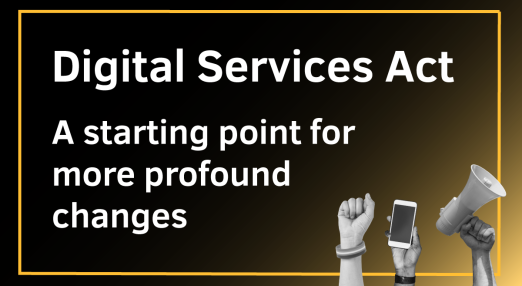The DSA should pave the way for systemic change
Today, 5 July, is a victorious day for human rights online as we embark on the next stage in our journey – real alternatives to the currently dominant surveillance business model. The European Parliament’s approval of the Digital Services Act (DSA) will bring many opportunities to limit the huge power Big Tech companies like Google, Meta (Facebook) and Amazon have over people and democracies. However, this regulation is only the first step in ensuring people’s rights online are protected, more work is needed for a better internet. Now, it is imperative that we see strong enforcement by regulatory authorities that will ensure the high human rights standards the new rules promise.
Filter resources
-

The DSA should pave the way for systemic change
Today, 5 July, is a victorious day for human rights online as we embark on the next stage in our journey – real alternatives to the currently dominant surveillance business model. The European Parliament’s approval of the Digital Services Act (DSA) will bring many opportunities to limit the huge power Big Tech companies like Google, Meta (Facebook) and Amazon have over people and democracies. However, this regulation is only the first step in ensuring people’s rights online are protected, more work is needed for a better internet. Now, it is imperative that we see strong enforcement by regulatory authorities that will ensure the high human rights standards the new rules promise.
Read more
-

Civil society groups urge EU Parliament to use all its powers to ensure Digital Markets Act enforcement has necessary resources
On June 28, EDRi and 16 civil society organisations urged the European Parliament to focus its attention on the Digital Markets Act (DMA) enforcement.
Read more
-

European Commission must uphold privacy, security and free expression by withdrawing new law, say civil society
In May, the European Commission proposed a new law: the CSA Regulation. If passed, this law would turn the internet into a space that is dangerous for everyone’s privacy, security and free expression. EDRi is one of 134 organisations calling instead for tailored, effective, rights-compliant and technically-feasible alternatives to tackle this grave issue.
Read more
-

Consumer and digital groups in Europe and the U.S. call for a full ban on surveillance-based advertising
On 1 June, the Transatlantic Consumer Dialogue (TACD), that EDRi is part of, published a policy resolution on banning surveillance-based advertising. The invasive practices of collecting, sharing, and processing of individual data to deliver personalized advertising, has become the primary business model in the online advertising space. Surveillance advertising is promoted by the world’s largest technology companies, like Meta (Facebook) or Alphabet (Google), and is a key driver behind the spread of misinformation, undermining democratic discourse, economic and political equity, marketplace competition, privacy, public health, and basic consumer protections.
Read more
-

Digital rights organisations call to dismiss the media exemption in the European Media Freedom Act
EDRi and our members Homo Digitalis, Access Now, EFN, Vrijschrift, and Državljan D are calling on the European Commissioners Vestager, Jourová and Breton to dismiss the ‘media exemption’ in the EMFA.
Read more
-

Private and secure communications attacked by European Commission’s latest proposal
On 11 May, the European Commission put forward a proposal for a ‘Regulation laying down rules to prevent and combat child sexual abuse’ to replace the interim legislation that EDRi fought against last year. In our immediate reaction, EDRi warned that the new proposal creates major risks for the privacy, security and integrity of private communications, not just in the EU, but globally. Here, we unpack a bit more about the legislative proposal, and why we are so concerned.
Read more
-

Elon Musk buying Twitter. What could possibly go wrong?
A new chapter of the surveillance capitalism saga happened just three days after the EU members adopted the final agreement on the Digital Services Act (DSA). The board of directors of Twitter accepted Elon Musk’s offer to buy the company for USD 44 billion. The deal is not closed yet, and now the ball is in Twitter’s shareholders to accept or reject the offer. This news has grabbed the media's attention worldwide and opened public discussions on how this would affect not only the features of Twitter but also freedom of speech in the digital sphere.
Read more
-

Twitter Has a New Owner. Here’s What He Should Do
Elon Musk’s purchase of Twitter highlights the risks to human rights and personal safety when any single person has complete control over policies affecting almost 400 million users. And in this case, that person has repeatedly demonstrated that they do not understand the realities of platform policy at scale.
Read more
-

Putting the brakes on Big Tech’s uncontrolled power
Will 2022 go down as the year the EU tamed Big Tech? In the very early morning hours of Saturday, 23 April, after 16 hours of final negotiations, EU lawmakers reached an agreement on the Digital Services Act (DSA), which is certainly a watershed moment for our digital future. As the deal reached is a top-level political agreement, the final text of the law is yet to be released.
Read more
-

EU negotiators approve good DSA, but more work is needed to build a better internet
Friday night’s political agreement on the Digital Services Act (DSA) is a good first step towards protecting people’s rights on the internet and to some extent limiting the immense power that Big Tech companies have over people and democracies.
Read more
-

A new crisis response mechanism for the DSA
EDRi is one of 38 civil society organisations jointly raising our voices to the DSA negotiators to stop negotiating outside their respective mandates and respect the democratic process of the EU. We demand concrete improvements necessary for the Crisis Response Mechanism (CRM) to respect international human rights law and prevent the future abuse of those emergency powers. Add your voice now!
Read more
-

Get your extra reading on “cookie consent” and AdTech done
On 22 February, the Belgian Data Protection Authority (DPA) made a decision regarding complaints about the Internet Advertising Bureau Europe (IAB Europe) "consent framework". This is a commonly used cookie pop-up asking for "consent" to be tracked.
Read more
